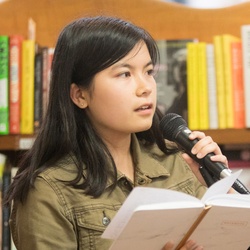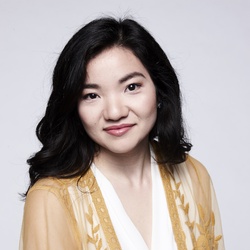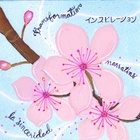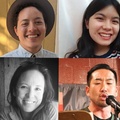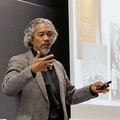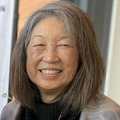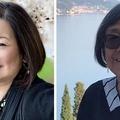How do memories, observations and spirits transfer through our bodies and onto the page? How does a poem reveal where we hold the gift and burden of memory in our body?
Happy August everyone...I’m excited to bring two beautiful young voices into the “Nikkei Uncovered...” fold. This month, we have Yonsei teen, Greer Nakadegawa-Lee hailing from Oakland, and Gosei Lauren Ito, based in San Francisco via Seattle. On the surface, their poems may be read as text tied to identity and family history, but I read these as body poems - there is a kind of tactile, somatic exploration emerging from their poetics here. Enjoy.
—traci kato-kiriyama
* * * * *
Greer Nakadegawa-Lee is 15 years old and attends Oakland Technical High School. She has written a poem everyday for roughly a year and a half, and she was a finalist for the 2019 Oakland Youth Poet Laureate. Her first chapbook A Heart Full of Hallways will be published by Nomadic Press later this year.
Tourist
As if my whole body is just surface.
As if I could peel away my skin,
as if I could strip away,
as if removing parts would somehow make me into who I was always meant to be,
a child of spirit,
a child of trees flowering out of my fingernails,
rows of classrooms,
rows of offices all stacked up in my straight spine,
a child of a nation,
a child whose body is
a nation,
I want to be who I was always meant to be.
Some days I am all body.
I am all stomach,
all knuckles and knees and dead skin,
other days I am the great-granddaughter of a country in which I am a tourist,
I could say
I am just an American tourist in Japan,
but that’s not the full story,
the truth is I am always a tourist in my own body.
And America,
her soil knows this about me.
That I am not a child of spirit,
I am flesh and blood and hers in all my colors,
and despite it all I do not think she wants me if I’m like this,
even though generations of my family have made me America’s daughter
I still cry for phantom limbs.
I still hurt as though my skeleton belongs somewhere else,
for countries I can never call home,
Sometimes I feel more split than mixed.
Explosions defining the strongest borders in my blood,
and in this way I am a child of nations,
In this way,
my body understands more about history than I ever will.
* This poem is copyrighted by Greer Nakadegawa-Lee (2019).
* * * * *
Lauren Emiko Ito is a Gosei (fifth generation Japanese American) poet, performer, and community craftswoman from an island outside Seattle. Her writing and community organizing explore the tensions of choice and force within identity, inheritance, and home. Lauren’s work has been featured by The Seattle Times, Japanese American Citizens League, National Japanese American Historical Society, Civil Liberties United Anthology, and in various performance venues, including the Mission Arts Performance Project, Then They Came for Me exhibit, and The Beat Museum. Her most recent published work is featured in San Francisco’s Poet Laureate Kim Shuck’s anthology, The City is Already Speaking. She lives in San Francisco, and can almost always be found by the sea.
Gosei
Chasing
Tattered tails of kimono silk
The crisp bow of an obi
A language that fell from our mouths as bombs fell like rain over Hiroshima
Whiteness
Did we quench your thirst?
Our ashes glaze your teacups
Mons steep in a dashi brewed from flakes of crackling skin
Excavating
A kanji-inscribed inheritance
My grandfather’s sighs wheeze of Internment Camp dust
Slivers of polished sea glass rolling from shore to shore in a sea of tears.
* This poem was originally published in the Civil Liberties United Anthology, 2019.
5 Chapters of the Hiroshima Memorial
I.
I sip Motoyasu River water, sour
Writhing taste buds seize
Tastes of chalky death
Temple turret ash
Mons burned into skulls as eyelids burst
Bubbled blood where tears should flow
But the bomb took those too, unwillingly
Claw marks
Human rain
Eerie silence fell after white wave gobbled hope from horizon
Only the river spoke
What have you done?
II.
My blood evaporated here
Off these steps
Became shadow blurs across bleached stone
Shudder of a second
Mother’s sewing scissors turned memento
Tricycle giggles fused dripping metal with toddler meat
Father’s lips ripped from jaw as gums screamed
My blood ran black here
Condensed into soot clouds that poured death rain
Filled gaping corpses whose last words were “water please”
Teardrops reeked
Of a hell stewed over burnt, schoolchildren’s laughter and
Radioactive paper cranes in August.
III.
I ran into the river
I cried for my mother
I grasped my brother’s limp fingertips
I crumpled on the street as my skin ascended
And then he died, on August 31st, 1945
And then she died on September 12th, 1945
And then he died on September 28th, 1945
And then she died on October 8th, 1945
I was trapped, under the rubble, petrified
Chanting my school’s song into darkness
Until I was the only one left singing.
IV.
Censorship does funny things
Mangles memory
Makes you forget where you came from
Who did what
Why the tongue-cut sparrow stopped singing
What the blood moon really means
How rain ran black
Peeking through a farmhouse window in the mountains
Eye sockets packed with ash
No one’s home
Lunchbox on the altar but the bottom’s burned out
Can’t even hold a ball of rice
Therefore, it serves no purpose
Air trembles—lonely, damp, turpentine
Incense hasn’t seen these walls for decades, it seems
Has something died in this place?
Between the floorboards, perhaps?
V.
I cling to Japanese words in my poetry
But a handful is all I can hold
Threading my grandmother’s prayer beads
namu amida butsu
namu amida butsu
namu amida butsu
I ask for bigger palms.
* This poem is copyrighted by Lauren Emiko Ito (2019).
© 2019 Greer Nakadegawa-Lee; Lauren Emiko Ito




